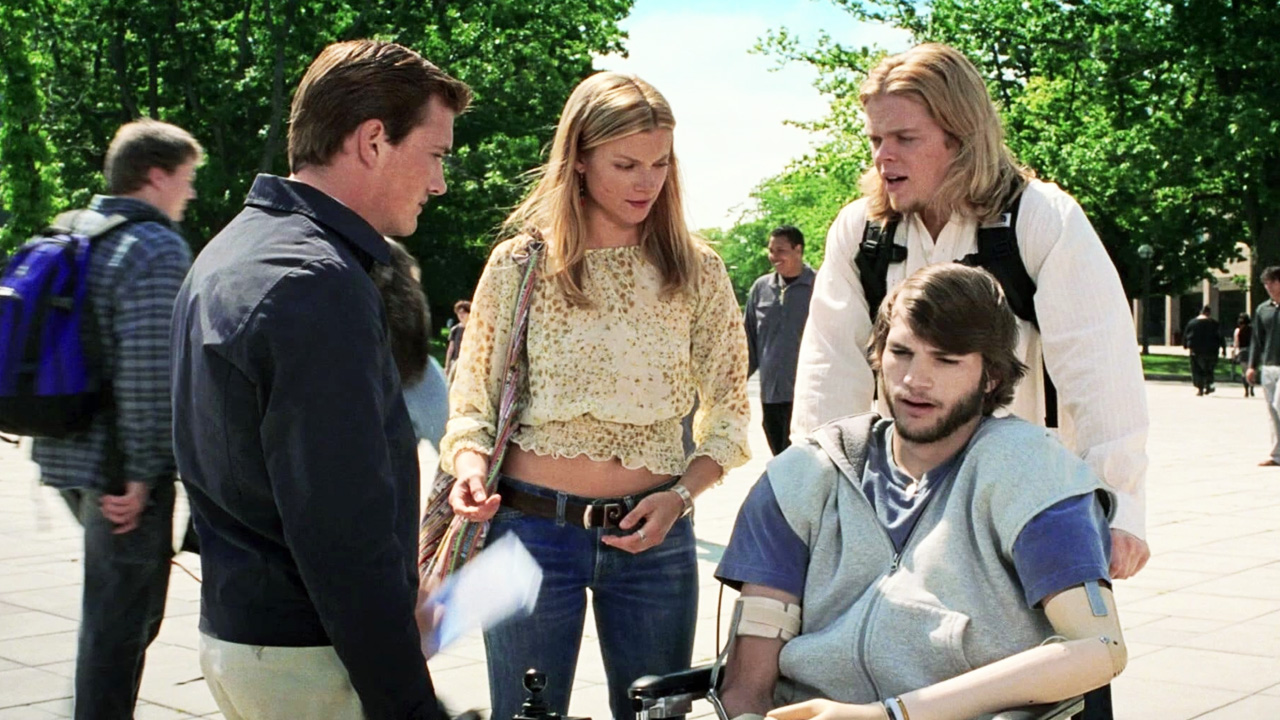Retrospective: is The Butterfly Effect the most horrifically bleak time travel movie of all time?

Ashton Kutcher can’t help fiddling around with his tragic past in 2004’s The Butterfly Effect, an unforgettably dark sci-fi thriller. Here’s Luke Buckmaster on the film’s troubling moral questions.
You’ve never seen a sci-fi or a thriller quite like The Butterfly Effect: a wildly in-your-face time-travel-with-a-twist story about a man who uses his personal journals to traverse the temporal continnum, setting out to right certain wrongs—with decidedly ghastly results. Starring Ashton Kutcher in the lead role as Evan, the diary enthusiast whose written recollections form his equivalent of Doc Brown’s DeLorean, this film is so gut-wrenchingly dark and twisted I’d also call it a horror movie, with virtually no respite once its core premise swings into gear.
The horror comes in part from wince-inducing scenes that’ll have you watching through the slits of your fingers. One that involves a woman walking towards a dynamite-rigged mailbox is too disturbing to put into words; likewise for another involving a tortured animal. But the horror also comes from its stunning reversal of moral expectations: more specifically the terror of watching somebody attempt to do the right thing, while in the process unwittingly orchestrating situations a thousand times worse.
“Every time I try to help someone, everything just goes to shit,” Evan says, reinforcing a point the film makes with sledgehammer-to-the-face subtlety. Its title stems from a concept related to Chaos Theory: that a small event in one part of the world can massively affect another—the old “the butterfly flutters its wings and causes a tornado” chestnut. Co-writers and co-directors Eric Bress and J. Mackye Gruber apply that idea not to distance, but time, creating a mess of multi-versian outcomes, where the cost of fixing one or more lives is the destruction of another.
The Butterfly Effect opens with Evan in a panic, running into an office and hiding under a desk as he writes a note, reading his words aloud for the audience’s benefit: “if anyone finds this, it means my plan didn’t work and I’m already dead.” This is called beginning in media res—or “in the thick of it”—thrusting audiences into a dramatic scenario that evokes obvious questions i.e. what happened, what went wrong, does this dude suffer from some kind of iron deficiency?
The story jumps back 13 years, with Evan as a normal, nice kid, notwithstanding some moments when he does weird things he cannot recall—drawing a shockingly violent doodle in art class, for example, and holding a knife while staring menacingly ahead. A psychologist suggests he suffers from a “missing father complex” but it’s more complicated: these apparent “blackout” episodes are the moments into which he time travels. Evan discovers his unusual ability in college, revisiting his past to remedy terrible formative events.
These revolve around a childhood friend, Tommy (played in different timelines by William Lee Scott, Jesse James and Cameron Bright) who’s like the kid from The Omen or We Need to Talk About Kevin—which is to say pure, naked evil. Tommy’s sister is Evan’s love interest Kayleigh (Amy Smart, Irene Gorovaia and Sarah Widdows) and their father is a pedophile named George (Eric Stoltz).

In one chain of events, Evan travels back to scare George out of abusing Kayleigh; he’s successful, but as a consequence, George comes down extra hard on Tommy, making him even more of a monster. When released from prison he comes after Evan—culminating in a violent showdown in which Evan kills him, then goes to jail on murder charges. That’s just one example and it’s not the most hard-hitting. Eventually Bress and Gruber find some kind of compromise, delivering an ending that isn’t happy per se (in many ways it’s a downer, though nothing compared to the director’s cut) but at least leaves the characters mostly unaffecred by Evan’s interference.
It’s rare to see a film with a moral compass like this—so grossly pessimistic and sensationally askew. You’d be excused for thinking the underlying message is: you can’t improve the world, so don’t bother trying. Evan’s father (Callum Keith Rennie), who suffers from the same curse, says as much when he screams “there is no right. You can’t change who people are, without destroying who they were.”
On the other hand, The Butterfly Effect is, in a strange way, about how our actions really can make a difference, in the sense what we do in our lives has the potential to dramatically influence the people around us. It stands to reason that, if changing things can go all bad, they could also go all good, right? After rewatching this shockingly unique and abrasively staged film, I’ll hold onto even the faintest glimmers of optimism. Time for a stiff drink.






















